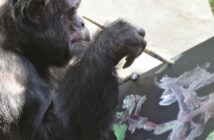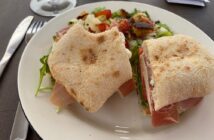OBSERVING SEVENTY-FIVE YEARS FAIRCHILD TROPICAL BOTANIC GARDEN
LAST INSTALLMENT OF A SIX-PART SERIES
The Fairchild Tropical Botanic Garden was dedicated on Wednesday, March 23, 1938, in the name of botanist and plant explorer David Grandison Fairchild (1869 – 1954). Seventy-five years later, this beloved South Florida venue continues to evolve and prosper for the public benefit. Two elements integral to the Garden’s success since its inception–education and volunteerism–are featured in SoMi Magazine’s sixth and final feature about this world-class arboretum.
Volunteer with school groupTHE NEED FOR SCIENCE
TThe Garden of Eden may boast the singular distinction of being the only planned garden not fashioned by the human hand. All others, from the Fairchild to the humble vegetable plot, demand labor, constant care and a mission.
Fairchild’s mission is, “To save tropical plant diversity by exploring, explaining and conserving the world of tropical plants; fundamental to this task is inspiring a greater knowledge and love for plants and gardening so that all can enjoy the beauty and bounty of the tropical world.”
Education continues to be at the heart of Fairchild’s well-deserved reputation as one of the world’s premier botanical gardens. In response to the critical need for more instruction in the disciplines of science, technology, engineering and mathematics (STEM), Fairchild uses the environment as the integrating concept for its programs for students from kindergarten to post-graduate studies. Their programs are designed to encourage students to remain in science-based disciplines. With a robust background in STEM studies, students will have the ability to meet the ever-increasing need for science-based education demanded by the workplace.
Volunteers at Chocolate FestivalStudents in the United States have been falling behind students from other industrialized nations in STEM studies. In 2012, there were 29 industrialized nations whose high school students out-performed American high school students in mathematics and 22 nations that out-performed our high school students in science. The statistics for American students in 2013 indicated that 44 percent of high school graduates were prepared for college-level mathematics. In 2009, 36 percent of our high school students were ready for college-level science. While the rest of the world prepares its students for a workplace that increasingly relies on STEM disciplines, the United States continues to lose its competitive edge.
Growing a School GardenAccording to Amy Padolf, Director of Education at Fairchild, the goal is to provide a “comprehensive environmental training pipeline that extends from early childhood through advanced graduate studies.”
Their environmental studies-based programs are incorporated into school curricula and the programs are made available to students regardless of age, race, religion, socio-economic status or ability. Fairchild has been encouraging a growing number of students from diverse backgrounds (who are traditionally underrepresented in science-based disciplines) to enroll in their K-12 programming. Of the 150,000 students participating in the Fairchild Challenge, Explorer, and Discovery programs, about 65 percent are from underrepresented groups.
“We’re changing the face of science,” said Padolf.
Botanical Fashion Show – David Lawrence Jr. K-8 CenterCHALLENGES, EXPLORATION AND DISCOVERIES
Fairchild continues to increase the number, scope and influence of its educational offerings on site and in classrooms within the county and around the world. Students attending pre-school to high school have the ability to enhance science education via interdisciplinary, inquiry-based learning. Through partnerships with Florida International University, Miami Dade College, and the University of Miami, Fairchild plays an important role in providing opportunities ranging from internships to long-term fellowships and from scholarships to degree programs in biology, environmental science and natural resources management. For those interested in lifelong learning, Fairchild’s popular Continuing Education program offers 150 classes from horticulture to photography, to art and the Everglades.
The Fairchild Challenge is an annual, standards-based, environmental education outreach program that offers multi-disciplinary challenges for elementary, middle and high school students. From its beginning in 2002, the Challenge has become a worldwide model for engaging youth in science and the environment by innovatively and effectively promoting science literacy among a diverse constituency of learners from schools in Miami-Dade and Broward counties. The program is a free, interdisciplinary competition that is aligned with state educational standards.
This year more than 125,000 students and teachers from 263 schools participated in the Challenge, making it the largest and most successful in its history. Thanks to the opening and integration of the DiMare Science Village and greater collaboration with Fairchild’s Science Conservation team, participants have achieved a greater depth of learning. The continued success of the program has captured national and international interest and garnered awards. Recently, Fairchild was chosen to receive the Institute of Museum and Library Service 21st Century Museum Professionals grant (one of nine sites nationwide), for the Challenge.
The Explorer program has been Fairchild’s signature education program for over 35 years. Students in grades pre-K through five are immersed in hands-on activities aimed at revealing their “inner scientist” by helping them understand the natural world through field studies (with the aid of a hand lens).
The Discovery program for students in grades three through 12 offers a selection of guided and independent field studies to enhance science and environmental education. Teachers can chose from a menu of age-appropriate topics and activities for their students such as collecting scientific data for Fairchild’s researchers, native and non-native animal species, and exploring the diversity of the plant kingdom, among others.
LEARNING CONTINUES
Fairchild’s educational mission extends to hosting graduate students who specialize in topics such as botany, tropical biodiversity, and conservation. Upon graduation, they secure jobs in the public and private sectors working to preserve the environment and conserve biodiversity.
In 2011, a unique program for Ph.D. candidates was developed awarding Fairchild teaching fellowships as an alternative to a teaching assistantship position at the university. During this three-year appointment, Fellows work with the Fairchild Challenge to mentor students, develop research opportunities for schools and learn how to better communicate their science to the greater community.
Fairchild’s dedication to education is a long-standing tradition that has been the institution’s hallmark from its inception. Along with the mission to educate comes the need to establish the capacity to staff an 83-acre garden, laboratories, research centers, programming, events and all the “back of the house” activities that make the Fairchild such a success.
While it is true that paid, professional staff is essential to the operation of Fairchild, it could not be accomplished without the assistance of a large group of highly motivated and committed volunteers. Volunteerism shares with education the same venerated and long-standing history–and for good reason. For example, in the Education Department alone, a professional staff of 13 could not enjoy the success of the myriad and multi-faceted education programs without the work of scores of volunteers.
“They make it all run,” said Amy Podolf.
IT TAKES A VILLAGE
Arlene Ferris, Director of Volunteer Services, has been working with Fairchild volunteers since 1987. She and two professional staffers are responsible for coordinating about 1,400 volunteers (650 full-time and 750 part-time). Annually they contribute about 80,000 hours to Fairchild.
“Our volunteers are a diverse group of people who come from all over the world, from every kind of background and with interests of all sorts. But they all understand and appreciate that Fairchild is all about education,”
said Arlene Ferris.
Volunteers support virtually every activity and program at Fairchild and are united in their love of nature and their commitment to serve. Prospective volunteers have the opportunity to attend Volunteers Information Days scheduled four times per year. There is an application and interview process and volunteers are selected for programs based on their experience, skills and availability.
Ms. Ferris believes it takes a special person to volunteer and be trained to lead a group of 12 high school students through the butterfly conservatory, for example. After only one visit, young students will often send letters to volunteer guides saying that they hope they will see them again the next time they visit.
“Without bragging, I think we have the greatest group of people anywhere. When you volunteer with us, you truly become a part of something—try it, it’s good for you,” said Arlene Ferris.
Currently, there are opportunities in education, horticulture, conservation, visitor services, membership, specials events, “Wings of the Tropics” butterfly conservatory, and the Weekend Educators program. To find out more about the volunteer program, training, and benefits, please consult the website or call 305.667.1651, ext. 3324.
Fairchild’s 75th anniversary celebration will culminate with the grand opening celebration of the Rose-McQuillan Arts Building in April. But there is no time like the present to treat yourself to a visit, join, volunteer and just plain enjoy one of the world’s best botanical gardens right here in Florida.



